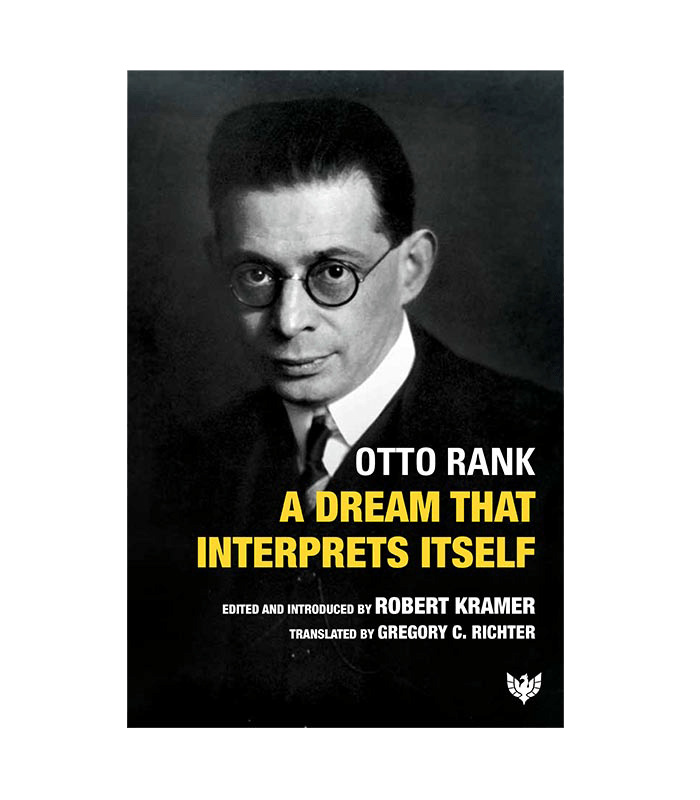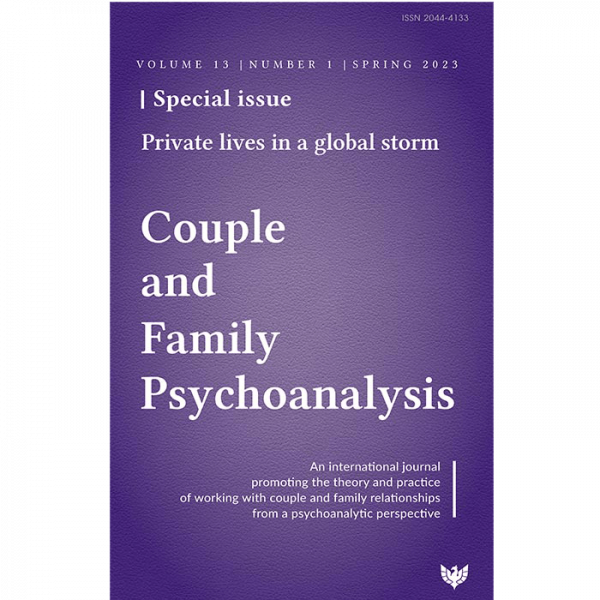Sigmund Freud hired Otto Rank as his secretary and funded Rank’s PhD in literature at the University of Vienna. In 1910, at age 26, Rank published ‘A Dream That Interprets Itself’. Freud could not praise the essay highly enough; impressed by Rank’s erudition, Freud invited his protégé to contribute two chapters, on poetry and myth, in 1914 to The Interpretation of Dreams. Thereafter, Rank’s name would appear under Freud’s on the title page of the foundational text of psychoanalysis for the next fifteen years.
Grateful for Freud’s generosity, Rank published a stream of articles and books advancing psychoanalytic thinking into almost every area of the arts and humanities, thus demonstrating to Freud’s critics that the validity of psychoanalysis did not hinge solely on his autobiographical work The Interpretation of Dreams. Rank died in 1939 and his work fell out of favor until a renaissance of interest beginning in the 1970s.
This is the first English translation of Rank’s masterpiece of dream interpretation, originally published in 1910 as “Ein Traum, der sich selbst deutet” in the journal Jahrbuch für Psychoanalytische und Psychopathologische Forschungen, 2(2): 465–540. It is accompanied by an in-depth introduction from editor Robert Kramer, the world’s only Rankian psychologist. The book is essential reading for all psychoanalytic scholars, practitioners, and historians, and those interested in dream analysis.





 Otto Rank was an Austrian psychoanalyst, writer, and philosopher. Freud considered Rank to be the most brilliant of his disciples. With access to the master’s most intimate thoughts and feelings, Rank contributed two chapters to The Interpretation of Dreams in 1914. His name would appear below Freud’s on the title page for the next fifteen years.
Otto Rank was an Austrian psychoanalyst, writer, and philosopher. Freud considered Rank to be the most brilliant of his disciples. With access to the master’s most intimate thoughts and feelings, Rank contributed two chapters to The Interpretation of Dreams in 1914. His name would appear below Freud’s on the title page for the next fifteen years. Robert Kramer, PhD, is Director of Leadership Development at the Existential Humanistic Institute of Europe, with branches in Madrid, Budapest and Athens. Prior to joining EHI-Europe, he was visiting professor of psychology at Eötvös Loránd University (ELTE) in Budapest. At ELTE, he taught existential-humanistic psychotherapy. During Spring 2022, he was professor of psychoanalysis at ELTE, only the second person in Hungary to hold this title. The first was Sándor Ferenczi. He has lectured on the life and work of Otto Rank at the 3rd World Congress on Existential Psychology (2023) in Athens, Greece; Sigmund Freud University in Vienna; Corvinus University of Budapest; George Washington University; American University; the American Psychological Association; the International Psychoanalytical Association; the Sigmund Freud Museum in Vienna; The Program for Hermeneutics and Cultural Studies at Bar-Ilan University, Israel; the University of Athens Medical School, Greece; the International Institute of Existential and Humanistic Psychology, Beijing; the William Alanson White Institute, New York; the Indiana Society for Psychoanalytic Thought in Indianapolis; the Existential-Humanistic Institute, San Francisco; and the University of Pennsylvania School of Social Work in Philadelphia.
Robert Kramer, PhD, is Director of Leadership Development at the Existential Humanistic Institute of Europe, with branches in Madrid, Budapest and Athens. Prior to joining EHI-Europe, he was visiting professor of psychology at Eötvös Loránd University (ELTE) in Budapest. At ELTE, he taught existential-humanistic psychotherapy. During Spring 2022, he was professor of psychoanalysis at ELTE, only the second person in Hungary to hold this title. The first was Sándor Ferenczi. He has lectured on the life and work of Otto Rank at the 3rd World Congress on Existential Psychology (2023) in Athens, Greece; Sigmund Freud University in Vienna; Corvinus University of Budapest; George Washington University; American University; the American Psychological Association; the International Psychoanalytical Association; the Sigmund Freud Museum in Vienna; The Program for Hermeneutics and Cultural Studies at Bar-Ilan University, Israel; the University of Athens Medical School, Greece; the International Institute of Existential and Humanistic Psychology, Beijing; the William Alanson White Institute, New York; the Indiana Society for Psychoanalytic Thought in Indianapolis; the Existential-Humanistic Institute, San Francisco; and the University of Pennsylvania School of Social Work in Philadelphia. Gregory C. Richter (PhD in Linguistics, University of California San Diego, 1982) taught German and Linguistics at Truman State University, Missouri, from 1983 to 2022. He maintains interests in formal linguistics and in translation theory. His publications include numerous translations from German, and centre on Viennese psychoanalysis. He has produced new renderings of Beyond the Pleasure Principle (2011), The Future of an Illusion (2012), and Civilization and its Discontents (2015) by Sigmund Freud, all at Broadview Press. He has also produced translations of Otto Rank’s The Incest Theme in Literature and Legend (1992), Psychology and the Soul (1998, with E. James Lieberman), and The Myth of the Birth of the Hero (2004, with E. James Lieberman), all at Johns Hopkins University Press. More recently, he served as translator for The Letters of Sigmund Freud and Otto Rank: Inside Psychoanalysis (2011, edited by E. James Lieberman and Robert Kramer), Johns Hopkins University Press. Other publications include translations of works in French and Chinese. In the past few years, he has also served as copy editor for two presses – Ex Ophidia Press and Plain Wrapper Press Redux.
Gregory C. Richter (PhD in Linguistics, University of California San Diego, 1982) taught German and Linguistics at Truman State University, Missouri, from 1983 to 2022. He maintains interests in formal linguistics and in translation theory. His publications include numerous translations from German, and centre on Viennese psychoanalysis. He has produced new renderings of Beyond the Pleasure Principle (2011), The Future of an Illusion (2012), and Civilization and its Discontents (2015) by Sigmund Freud, all at Broadview Press. He has also produced translations of Otto Rank’s The Incest Theme in Literature and Legend (1992), Psychology and the Soul (1998, with E. James Lieberman), and The Myth of the Birth of the Hero (2004, with E. James Lieberman), all at Johns Hopkins University Press. More recently, he served as translator for The Letters of Sigmund Freud and Otto Rank: Inside Psychoanalysis (2011, edited by E. James Lieberman and Robert Kramer), Johns Hopkins University Press. Other publications include translations of works in French and Chinese. In the past few years, he has also served as copy editor for two presses – Ex Ophidia Press and Plain Wrapper Press Redux.
Sander L. Gilman, author of Are Racists Crazy? How Prejudice, Racism, and Antisemitism Became Markers of Insanity –
‘Otto Rank’s A Dream That Interprets Itself is a tour de force by a thinker who radically rethought Freud’s model for dream analysis. Bringing all of his cultural and literary sophistication to bear, Rank examines something very rare in the early psychoanalysis, a dream from a member of the working class, a governess in a wealthy family. Such analysis provides not only innovative insight into the internal processes of the dreamer but into her sense of the world which she inhabits. A shining translation by Gregory Richter of a major milestone in the psychoanalytic literature of the first generation.’
Professor Brett Kahr, Senior Fellow, Tavistock Institute of Medical Psychology, London, and visiting professor of psychoanalysis and mental health at Regent’s University London –
‘Otto Rank – one of the founders of global psychoanalysis – became, alas, “vilified, ignored, or simply forgotten”. Happily, due to Robert Kramer’s passionate and meticulous scholarship and Gregory Richter’s superb and fluid translation skills, English-language readers now have the privilege of enjoying Rank’s much-overlooked text, which provides us all with immense insight and understanding of dreams and the human mind.’
Professor Aner Govrin, Director of Psychoanalysis and Hermeneutics Doctoral Track, Bar-Ilan University –
‘A young woman amused by her eccentric dream asks Otto Rank to interpret her dream. She is not a patient, not neurotic, and has little interest in psychoanalysis. Rank uses her dream to prove the validity of Freud’s theory. The result is a remarkable and exceptionally multi-layered, highly intricate text with an insightful introduction by leading Rankian expert Robert Kramer.’
Nick Campion, MBACP, integrative psychotherapist –
‘This short book published for the first time in English translation takes us through Rank’s interpretation of two dreams told to him by one woman. […] The book is very much of its time – Rank’s interpretation operates within a set of turn-of-the-century cultural and sexual norms, and it would be fascinating to see how modern gender theory and politics would play into the interpretation of those dreams now.’